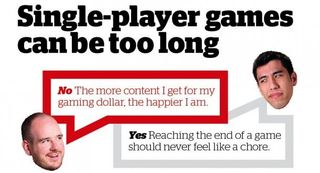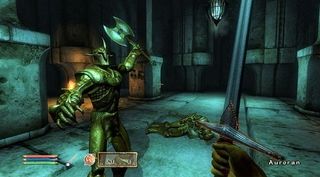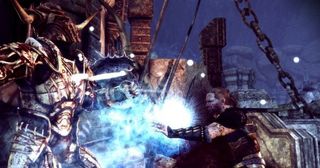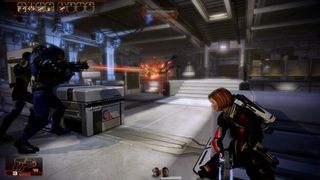
Face Off pits two verbal gladiators against each other as they attempt to tackle gaming's most perplexing conundrums. This week we decide if single player experiences can be too drawn out, or if more is always better. Grab some popcorn and get ready to see these two contenders duke it out with argument uppercuts and logic bombs.
Intern Lucas Sullivan: Sometimes, Dan, less is more. Sometimes, I just want to finish a game and go on living my life (which usually entails starting a new game).
Reviews Editor Dan Stapleton: Kids today, with your flea-sized attention spans! More game is a problem in the same way that more money means mo' problems—if you've got to have a problem, that's a pretty good one to have.
Lucas: There's something to be said for cutting out aimless content if it makes for a more focused experience. It's the same reason most people would prefer a tightly edited action flick (Terminator 2: Judgment Day) to one that has pointless, go-nowhere side-plots (Terminator Salvation). You just can't craft a compelling 100-hour story.

Dan: Not with that attitude, you can't. I'd argue that Bethesda did a pretty good job of it with Oblivion, Fallout 3, and Fallout: New Vegas. They allow you to head straight for the end of the story if you want, but if you do, you're missing out on the best parts of the game. Even after exploring those games for 100 hours, there's still stuff I haven't seen.
Lucas: If you want to talk to more stiffly animated NPCs, then be my guest. But unless you're playing a sandbox game, a story needs to move you forward and keep you engaged, not task you with a bunch of busywork and errands.
Dan: You only need to look as far as television or comicbooks to see how a story can be extended practically indefinitely with an episodic structure. You have the one overarching story, and within it you can have countless stories that each give their own sense of closure without closing the book. Dragon Age: Origins is a pretty good example of that style.
PC Gamer Newsletter
Sign up to get the best content of the week, and great gaming deals, as picked by the editors.

Lucas: What if side-quests are getting in the way of your sense of closure? A game's finale loses a lot of impact when you can barely recall what you're fighting for in the first place. Remind me why Commander Shepard's scanning for minerals when she should be saving the universe?
Dan: Hey, if you know of a way to save the universe without a healthy dose of Element Zero, I'd like to hear it. Besides, you can stop playing a game when you've had your fill and watch the ending on YouTube, but you can't play more of a game you're enjoying when it up and ends before you decide you're done. Replaying just isn't the same.
Lucas: Remember Lord of the Rings: Return of the King? Remember how you just kept wanting it to end during those last 20 minutes? That's what unnecessary sections near the end of a game feel like. You can't tell me you've never loaded up a level and prayed that it would deliver the final boss.

Dan: I remember going out and getting the LOTR Extended Edition on DVD. I also remember that most game endings suck, and the longer they can be delayed, the better (I'm looking at you, BioShock's Frank Fontaine and Borderlands' random tentacle monster).
Lucas: Let me finish a game while it's still fresh, so I'm left wanting more. When it comes to a single-player narrative, there's such a thing as overstaying your welcome. If you're still starving for content, well, that's what DLC and sequels are for.
Dan: A game that goes 60-plus hours—provided it's a good game, of course—is the gift that keeps on giving, and I'd rather play one long, great game than one short great game and two forgettable ones. n
Hey folks, beloved mascot Coconut Monkey here representing the collective PC Gamer editorial team, who worked together to write this article! PC Gamer is the global authority on PC games—starting in 1993 with the magazine, and then in 2010 with this website you're currently reading. We have writers across the US, UK and Australia, who you can read about here.
Most Popular






